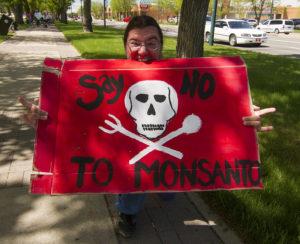Earlier this year, two million people in 52 countries and 436 cities around the world declared our right to clean and real food by marching against agribusiness giant Monsanto. Here’s a glimpse of how it looked here in Houston back at the end of May:
[pb_videoshowcase group=”11″]
Now a second global march has been announced for October 12.
Why march? Here’s how the originators of the action put it in their manifesto:
- Research studies have shown that Monsanto’s genetically-modified foods can lead to serious health conditions such as the development of cancer tumors, infertility and birth defects.
- In the United States, the FDA, the agency tasked with ensuring food safety for the population, is steered by ex-Monsanto executives, and we feel that’s a questionable conflict of interests and explains the lack of government-led research on the long-term effects of GM products.
- Recently, the U.S. Congress and president collectively passed the nicknamed “Monsanto Protection Act” that, among other things, bans courts from halting the sale of Monsanto’s genetically-modified seeds.
- For too long, Monsanto has been the benefactor of corporate subsidies and political favoritism. Organic and small farmers suffer losses while Monsanto continues to forge its monopoly over the world’s food supply, including exclusive patenting rights over seeds and genetic makeup.
- Monsanto’s GM seeds are harmful to the environment; for example, scientists have indicated they have contributed to Colony Collapse Disorder among the world’s bee population.
Of course, Monsanto isn’t the only force behind GMOs, just the biggest of the major seed manufacturers with a long history of contributing to environmental damage in their quest to dominate as much of the global food supply as possible. As such, it’s a powerful symbol of the kind of corporate ideology that puts profits before people. As Alabama activist SI Reasoning told USA Today,
Monsanto’s handling of GMOs [is] a “huge, uncontrolled experiment on the American people.”
And for the most part, the only way we can opt out of that experiment is by going organic and completely avoiding food products that may contain some GMO ingredients – which is why labeling is imperative. It’s also desired by an overwhelming majority of Americans: 93%, according to a New York Times poll from earlier this year.
But this only addresses issues on a personal level, ignoring the continually growing evidence of health risks and environmental damage caused by chemically-fueled agriculture and industrial food manufacture. Hence, the rise of groups such as Millions Against Monsanto and global demonstrations.
Monsanto and its ilk are clearly feeling the heat. Most recently, they launched what purports to be a truth-telling website – “GMOAnswers” – but is actually a fine piece of propaganda meant to silence real concern about what their products are doing to us and our planet. “This latest effort,” Food & Water Watch executive director Wenonah Hauter told Reuters, “will likely do little to stop the consumer backlash against genetically engineered foods that has been brewing for years.”
As mentioned, that backlash will again take to the streets in a few weeks, including another march here in Houston. Details are available on the organizers’ Facebook page for the event. While on Facebook, you might also want to check out GMO-Free Texas.
 Those outside of Houston can find events planned for their city or region here or here. Hundreds of marches have already been confirmed in almost three dozen countries.
Those outside of Houston can find events planned for their city or region here or here. Hundreds of marches have already been confirmed in almost three dozen countries.
We encourage you to get out there on October 12 and add your voice to the demand for the clean and real food we both need and deserve.
Images by John Novotny & SarahBethB1, via Flickr
